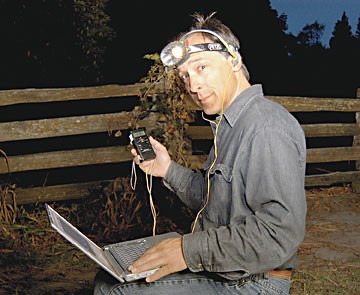
- Joe Szewczak in the field. Photo by Kellie Jo Brown.
It was just another typical evening in the Stewart-Brown household.
ME: Honey, would you like to hear some fun facts about bats?
SCOTT: Actually, I was just wondering if there were any fun facts about bats I hadn't heard already, so your timing is perfect.
ME: Did you know that there's a guy at HSU who has developed software to record the sounds that bats make and then analyze the data to identify which species are out there? He got a grant from a program at the Pentagon to go all over the country and set up these bat-monitoring systems.
SCOTT: The Pentagon is monitoring bats?
ME: Bats hate our freedom.
SCOTT: Well, we always knew that. What else have you got?
ME: You know how they emit these really high-frequency sounds to help them find things in the dark? Turns out that not only do they catch bugs in mid-air, but they can tell from the way the sound bounces off the bug whether it's the kind of bug they like to eat or not. They take about 10 snapshots a second of what's around them, just using sound.
SCOTT: How do we know that bats can tell what kind of bug it is?
ME: You can actually train bats to do little tricks in exchange for mealworms. In the laboratory you can put them on a perch and train them to pick one object over another in exchange for food -- like a soft thing versus a hard thing, a big thing versus a little thing -- and once they're trained to do that, it's pretty easy to do tests to see how accurately they can distinguish between one bug and another.
SCOTT: Won't they bite you if you put them on a little perch in a laboratory?
ME: Yeah. Joe Szewczak -- that's the guy at HSU -- says he gets bitten all the time. It's not a big deal, though -- you just have to get a rabies shot. But actually, bats don't really have very high rates of rabies. Natural populations of bats are less prone to rabies than other mammals like skunks. And it's not like they go after people and bite them. They just fly around at night and eat bugs. If a bat ever comes near you, it's probably because you've got a lot of bugs swarming around you.
SCOTT: I'll remember that next time I'm outside at night in a swarm of bugs.
ME: And when bats have babies --
SCOTT: Yes, how do bats have sex?
ME: Oh, I didn't ask that.
SCOTT: You didn't ask?
ME: It's none of our business how they have sex. But back to the babies. Bats, being mammals, give birth to live pups that are about half the size of an adult bat. It's like having a 50-pound baby. And do you know what the mothers feed them?
SCOTT: Bat milk?
ME: That's right. They nurse them until they're about six weeks old and they can fly around and eat bugs on their own. And in one species of bat, the males can actually lactate, too.
SCOTT: The bat-men make bat milk?
ME: Amazing, huh? Bats don't make nests, they just find warm places to roost. You can put up a bat house for them, but they would rather stay in an attic or under the eaves of a roof. But they know the bat house is out there, and they'll move into it if they need to.
SCOTT: We are not getting bats, if that's where you're going with this.
ME: Well, they're very small, and there's plenty of room up in the attic.
SCOTT: I think this concludes the fun facts portion of our evening. And if I go upstairs and find bats hanging upside down from our Christmas decorations, I'm going to know who let them in. If bats need a place to stay, they should go sleep with the chickens.
I don't think our hens would cozy up to a colony of bats, but stranger things have happened. Joe Szewczak is an associate professor at HSU's Department of Biological Sciences. He will share more fun facts about bats at the annual HBGF Speakers' Symposium on Saturday, Nov. 8. He will also discuss his recent work with two bat pollinators in Arizona, including the endangered Lesser Long-Nosed bat.
The topic of the symposium is pollinators; other presenters include Pete Haggard, co-author with his wife Judy of Insects of the Pacific Northwest, speaking about butterflies, and Robert Hewitt, director of LBJ Enterprises and former president of the local Redwood Region Audubon Society, speaking about birds.
It's all happening at the Humboldt Area Foundation in Bayside from 9-3:30 on Nov. 8. Register in advance by calling HBGF at 442-5139. You can also register at the door, but seating is limited. The fee is $25 for HBGF members, $30 for non-members and $20 for students, and lunch is included.
Comments